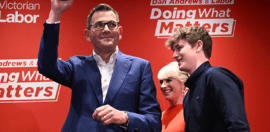Report Calls for Government to Defend Democracy

8 June 2017 at 8:50 am
The Australian government is being urged to take action to “defend democracy” and encourage vibrant debate on matters of public interest.
A new Human Rights Law Centre report, backed by 15 non-government organisations including Pro Bono Australia, has highlighted an “urgent need” to safeguard independent civil society voices and put a stop to a trend that “threatens to silence a sector that has much to contribute”.
Defending Democracy, which was launched by Australian Human Rights Commission president Professor Gillian Triggs at Progress 2017 on Wednesday, draws attention to financial and political pressures being put on civil society organisations to discourage them from speaking out.
Triggs said the “timely” report suggested “valuable initiatives to protect the community’s right to advocate for the environment and human rights”.
Human Rights Law Centre director of legal advocacy Emily Howie said it was a response to a “clear and worrying trend” of Australian governments seeking to restrict the free speech of not-for-profit organisations.
“A thriving democracy needs an informed public debate with a range of voices. However, governments are making it clear to charities that work with families and communities doing it tough, that if they speak out about government policy, their ongoing funding will be put in jeopardy,” Howie said.
“All governments find criticism inconvenient or uncomfortable, but that’s part and parcel of a good democracy. Instead of shutting down debate, governments should be enabling healthy, robust discussion.”
According to the report, which makes 10 recommendations for law, policy and practical reform, the government is using practices such as gag clauses in funding agreements and “threats to hamstring advocacy groups’ ability to fundraise” to silence the sector.
The report highlighted recent moves to ban foreign funding to NGOs and to limit NGO engagement in election activity.
It also said the Australian government had not ruled out changes to tax regulations that would restrict the ability of environmental organisations to fundraise and to challenge projects that damage the environment.
Speaking at a workshop at Progress on Tuesday Howie said “in a nutshell” the report looked at the financial and political pressures that were put on organisations, whether direct or indirect pressure, to stop them speaking out about the matters they are working on and which “are very much of public interest”.
“We know that people feel silenced, and that some organisations are perhaps unconsciously self-censuring because there are pressures on organisations to keep quiet and maintain their funding or their support from government,” Howie said.
“These are attacks that are on civil society that we used to associate with authoritarian regimes in other countries but more and more we’re seeing the so-called old democracies using financial levers and financial pressures to try and restrict the way that we speak out.
“We think these attacks are something that are really common across the sector and one thing that is great about this report is that it has brought together a whole lot of organisations from environmental groups to community organisations to human rights organisations to consumer groups, to talk about the threats that we share and how we can actually respond to those threats together.”
The report is endorsed by 15 Australian NGOs including Australian Progress, Pro Bono Australia, Oxfam, ACOSS, the National Congress of Australia’s First Peoples, the Australian Conservation Foundation, Choice, Community Council for Australia, ActionAid, GetUp!, the Wilderness Society, the National Association of Community Legal Centres, Community Legal Centres NSW, Justice Connect and the Reichstein Foundation.
Oxfam Australia CEO Helen Szoke said as global inequality increased it was “ever more vital that governments act to protect spaces for people’s voices to be heard”.
“The Australian government could be leading the charge, but as this report shows, urgent action is needed if Australia is to buck the global trend towards the stifling of public debate,” Szoke said.
Cassandra Goldie, CEO of ACOSS said a healthy and balanced Australia was about allowing everyone “the dignity of having their voices heard and for government to respect and support their participation”.
“We must protect civil society’s participation and engagement in our democracy or risk our democracy being eroded by only those with wealth and power being able to influence it,” Goldie said.
Howie said it wasn’t just about “resisting the bad stuff that is happening”, but actually trying to suggest proactive and positive ways “to try and better safeguard our ability to speak out independently”.
“Three of the recommendations that we have in the Defending Democracy report are about actual structural reforms that we might look at,” she said.
“The first one is pretty simple, and it is something that happened under the Gillard government. When governments enter into funding agreements with organisations there should be a clause in those agreements that says: for the avoidance of doubt, this organisation is able to engage in public advocacy. It should be crystal clear in the agreement and that should be a standard clause.
“The second thing is that we have something called the Not for Profit Freedom to Advocate Act. Essentially that was an act that was passed under the previous Labor government and was intended to protect our freedom to advocate – the very issues we’re talking about now. We’re seeing governments actually find loopholes to continue to apply this pressure without violating the terms of the act, so we think that act can actually be bolstered and improved.
“The third thing is our government, our public services, are run by public service values and we think that Australia’s advocacy, civil society participation in advocacy and freedom to advocate should be part of our public service values.”
Paul Oosting, GetUp! national director said strong, fearless advocacy from across civil society had made Australia a better place “in countless ways”.
“We need to defend that legacy, and defend all forms of civil society advocacy from political attacks,” Oosting said.







